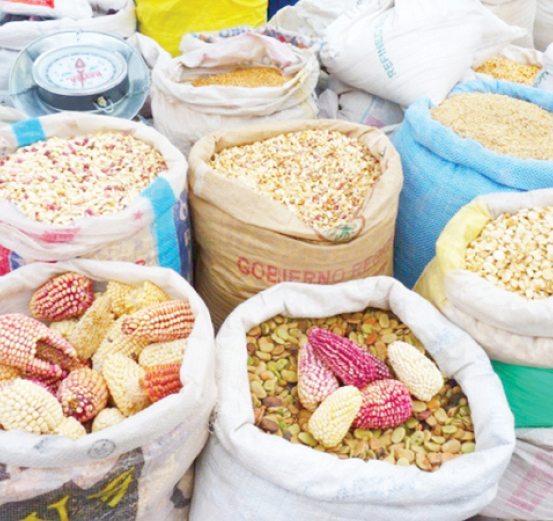How food fortification addresses malnutrition, builds healthy nation
Stakeholders and nutrition experts have lamented the government’s failure to implement guidelines on food fortification which has worsened the challenge of malnutrition, especially among children under-five. They spoke during a two-day advocacy workshop on improving food fortification compliance and promotion of workforce nutrition, organised for the media and Civil Society Organisations (CSOs), experts and stakeholders […]

Prices of foods have risen in Niger markets
Stakeholders and nutrition experts have lamented the government’s failure to implement guidelines on food fortification which has worsened the challenge of malnutrition, especially among children under-five.
They spoke during a two-day advocacy workshop on improving food fortification compliance and promotion of workforce nutrition, organised for the media and Civil Society Organisations (CSOs), experts and stakeholders by the Civil Society Legislative and Advocacy Centre (CISLAC) in collaboration with the Nigerian Economic Summit Group (NESG) and eHealth Africa in Lagos.
The workshop was a fallout of the non-implementation of the 2019 food fortification regulation with food producers not complying with the required specifications.
According to the organisers, the non-implementation of the regulation has negative consequences on the nutritional status of Nigerians with grave health and socio-economic consequences.
Bridging Nigeria’s 16.9m housing deficit requires synergy – Reps deputy speaker
Pensioners allege exclusion from palliatives
The Executive Director of CISLAC, Mr Auwal Rafsanjani who spoke through the Project Lead, Mrs. Lovelyn Agbor-Gabriel, also noted that the lack of awareness and poverty is impeding the demand for fortified food among poor households.
Rafsanjani said the objective of the gathering was to increase compliance to food fortification policy by food producers through improved legislative oversight and supervision of relevant agencies of government and to advocate for budgetary allocation and fund releases for relevant government agencies like the Federal Competition and Consumer Protection Council (FCCPC), National Agency for Food and Drug Administration and Control (NAFDAC) and the Standard Organisation of Nigeria (SON).
What is food fortification?
Food fortification, according to the World Health Organisation (WHO), means “increasing the nutrient value of foods by fortifying them with vitamins and minerals, like adding iodine to salt, or iron to wheat or maize flour.”
The NAFDAC food fortification regulation of 2019 also describes “fortified foods” as “foods to which vitamins, mineral nutrients or amino acids have been added for the purpose of preventing or correcting a demonstrated deficiency of one or more nutrients in the population groups.”
The regulations provided appropriate sanctions for defaulting food producers with a view to ensuring compliance.
However, over the years as stakeholders and experts at the workshop noted, the regulations are being observed in the breach thereby worsening the nutritional status of Nigerians.
According to the food fortification dashboard analysed at the workshop, which examined the food fortification status of Nigeria, most of the food items imported into the country are fortified below standard. The dashboard also showed that 71 per cent of products analysed by eHealth officials were not fortified.
A nutrition expert from the Department of Human Nutrition and Dietetics, Michael Okpara University of Agriculture, Dr Patricia Ukegbu, noted that the non-implementation of the food fortification guidelines had worsened the nutritional status of Nigerians and contributed to the growth of a malnourished population which has contributed to the reduction of productivity at the home and national levels.
She said, “Nigeria, according to UNICEF, loses an estimated $1.5bn in Gross Domestic Product (GDP) annually due to diminished productivity.
“But there are solutions which can alleviate the burden on hardworking men, women and families.
“Fortifying staple foods with essential vitamins and minerals, for instance, is one of the most effective ways of improving a population’s nutrition.”
She decried the prevalence of malnutrition in Nigeria, saying the country ranked number one in Africa and two in the world in terms of number of children malnourished.
Ukegbu said the malnutrition cycle must be broken at the family level as it is capable of transforming into a national emergency which reduces the productivity of the nation.
“If the mother has a compromised nutritional status, she may die before giving birth but if she survives it, the child will be malnourished. This will affect the growth of the child and also reduce his mental capacity.
“This will be a generational cycle of malnutrition thereby reducing the productive capacity of the nation as a whole,” she said.
The expert decried the high prevalence of malnutrition in Nigeria, saying over 35m children are malnourished. She stated that only 25% of children under five have the required Vitamin A supplements.
Another lecturer, Dr Omolola Okunlola, in her review of the food fortification policy of 2019 said Nigeria is facing a food security crisis which has also contributed to the high prevalence of malnutrition.
This, she noted, had weakened the global economy with Nigeria feeling the heat. She also said any food can be fortified and called on the regulatory authorities to implement the regulations on food fortification.
The lecturer stressed the need for adequate and sustainable funding of the regulatory authorities to implement guidelines on food fortification.
Dr Oluwatoyin Oyekenu of Global Alliance for Improved Nutrition (GAIN) who spoke on advocacy for food fortification, said improved advocacy can help to ensure that food fortification and workforce nutrition are prioritised and implemented.
Also lamenting the high prevalence of malnutrition in Nigeria, she said it is criminal to have over 10 million children suffering from stunted growth.
“A lot of people are frustrated because they cannot reach their potential due to malnutrition. The world programme estimates that over 40 million Nigerians are food insecure with many lacking access to nutritious food,” she stated.
